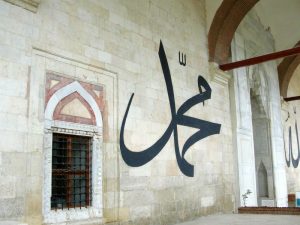Exaggerated Praise of the Prophet of Allah (Peace and Blessings Be Upon Him)
Answered by Mufti Muhammad ibn Adam
Question : Exaggerated Praise of the Prophet of Allah (peace and blessings be upon him)
|
|
|
|
|
|
|
Answer : The Hadith towards which you have referred is recorded by Imam al-Bukhari in his Sahih, on the authority of Sayyiduna Umar ibn al-Khattab (Allah be pleased with him) that he heard the Messenger of Allah (Allah bless him & give him peace) say: “Do not exaggerate in praising me as the Christians praised the son of Mary, for I am only a Slave. So, call me the Slave of Allah and His Messenger.” (Sahih al-Bukhari, no: 3261) The meaning of this Hadith is quite clear and simple, in that one must avoid exaggeration in praising the Messenger of Allah (Allah bless him & grant him eternal peace) in a manner the Christians praised Sayyiduna Esa (peace be upon him). Anything besides this has been implicitly permitted in this Hadith. Now, we need to see how the Christians exaggerated in their reverence for Sayyiduna Esa (peace be upon him). The Christians exaggerated in praising Sayyiduna Esa (peace be upon him) to the level that they considered him to be either a God, son of God or a partner of God. Hence, it will be completely unlawful and disbelief to elevate the status of the Messenger of Allah (Allah bless him & give him peace) in a manner that one considers him to be a God, son of God or a partner of Allah. Allah Most High is one and unique in his essence and attributes, as Imam al-Tahawi (Allah have mercy on him) states: “We say about Allah’s unity (tawhid) – with Allah’s help- that Allah is One, without any partners.” (al-Aqidah al-Tahawiyya, p: 5) The renowned commentator of Sahih al-Bukhari, Imam Hafidh Ibn Hajar al-Asqalani (Allah have mercy on him) states in the explanation of this Hadith, quoting from Ibn al-Jawzi: “The reason behind this prohibition (m: of exaggerating in the praise of the Prophet) was due to what was mentioned in the Hadith of Mu’adh, where he (Sayyiduna Mu’adh, Allah be pleased with him) sought the Messenger of Allah’s (Allah bless him & give him peace) permission in order to prostrate before him. The Messenger of Allah (Allah bless him & give him peace) forbade him from doing so. Hence, the Messenger of Allah (Allah bless him & give him peace) feared that someone else may exaggerate even more, thus he was quick to prohibit such exaggeration with great emphasis. Ibn al-Tin said: The meaning of “Do not exaggerate in praising me” is that do not praise me as the praise of Christians. So much so that some exaggerated and regarded him (Sayyiduna Esa) to be a partner of God. Some claimed that he was God himself, whilst others said that he was the son of God.” (Ibn Hajar al-Asqalani, Fath al-Bari, 12/183-184) The above passage from one of the greatest commentary on Sahih al-Bukhari quite clearly indicates that the prohibition is of giving the Messenger of Allah (Allah bless him & give him peace) the rank and status of Allah in any way or form. He is not God, neither a partner of God, nor His son. He is the Servant of Allah and his beloved Messenger (eternal peace and blessings be on him). This Hadith does not in any way forbid one from praising the beloved of Allah greatly and excessively. Our presence is because of the Messenger of Allah. He is our master, beloved, intercessor and leader. We love him greatly, more than anything and everything in this world. Hence, we should send blessings on him and praise him as much as we can. If we don’t praise the Messenger of Allah (Allah bless him & give him peace) and show reverence to him, then who will we praise. As long as one avoids considering the Messenger of Allah (Allah bless him & give him peace) being equal to Allah Most High and avoids attributing divinity to him, there is absolutely nothing wrong in exaggerating in his love and praise, as the author of Qasida al-Burda, Imam al-Busayri (Allah have mercy on him) so beautifully said: “Leave what the Christians claim about their Prophet. Then decide and say what you wish in praise of him (Allah bless him & give him eternal peace).” And Allah knows best |
|
|
|
Muhammad ibn Adam |
